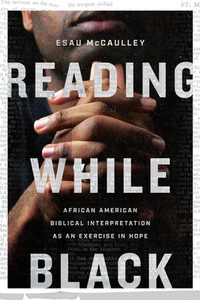Take a photo of a barcode or cover
236 reviews for:
Reading While Black: African American Biblical Interpretation as an Exercise in Hope
Esau McCaulley
236 reviews for:
Reading While Black: African American Biblical Interpretation as an Exercise in Hope
Esau McCaulley
Must read. In a time of a lot of much needed deconstruction, Esau begins the reconstruction showing us what a faithful Christian tradition looks like, found in the Black Church. All Christian will benefit greatly from reading this book as it sets us on a trajectory towards faithful biblical exegesis and application.
hopeful
informative
medium-paced
This book aims to do a couple of things: (1) to articulate a Biblical response to America’s race issues, and (2) to justify the validity of such a response. Although the brevity of this book prohibits it from providing much more than a starting point as regards (1), it makes a number of interesting points. Of particular note are the analyses of some of the more problematic passages in scripture, for example, the “governing authority” passage of Romans 13 which would appear to enjoin a slavish submission to the state; some key Old Testament passages about slavery, especially in Deuteronomy; and of course, the “slaves, obey your masters” verse in Ephesians. To be a Christian and to be concerned with race issues, one must grapple with these verses. Again, the analysis here is brief, but it appears to be pretty solid, and there are footnotes for further reading — definitely some food for thought, and a much-needed discussion. McCaulley articulates some pretty radical interpretations of these verses, but with arguments firmly rooted in rigorous exegesis and scholarship. I learned a lot even from these brief discussions.
In order to justify his approach, he lays out the issues in the church regarding the reception of Black exegesis. He portrays Black Christians as fighting a battle on two fronts: against revisionist liberal Christians on the one hand who fail to really enter into dialogue with the text, and conservative/establishment Christians on the other who see Black theology as biased and tainted. He successfully argues for the legitimacy/orthodoxy of Black theology, and demonstrates the impoverishment of the traditional “colorblind”/“neutral” conceptions. This is especially relevant in light of the Bible’s misuse historically as justification for slavery, and in pointing out its relevance to the ongoing issues. I learned a lot about church history and McCaulley's unique Black experience from these sections.
The tone of this book is very even and non-combative, but the argumentation remains strong. It’s a refreshing alternative to both the far-left mind-fuckery of Kendi, DiAngelo, and Oluo, and the conservative Christian alt-right who would deny that systemic racism is even a thing. Naturally, I have my complaints—he glosses over some points that bear more explanation, and certain portions stand in need of an editor. But these are minor complaints, and I won’t dwell on them. Overall I wouldn’t hesitate to recommend this to any Christian hoping to get a better understanding of the race issue and remain firmly rooted in scripture, or anybody looking for a voice that steadfastly avoids the simple binaries that tend to dominate the discussion in general.
In order to justify his approach, he lays out the issues in the church regarding the reception of Black exegesis. He portrays Black Christians as fighting a battle on two fronts: against revisionist liberal Christians on the one hand who fail to really enter into dialogue with the text, and conservative/establishment Christians on the other who see Black theology as biased and tainted. He successfully argues for the legitimacy/orthodoxy of Black theology, and demonstrates the impoverishment of the traditional “colorblind”/“neutral” conceptions. This is especially relevant in light of the Bible’s misuse historically as justification for slavery, and in pointing out its relevance to the ongoing issues. I learned a lot about church history and McCaulley's unique Black experience from these sections.
The tone of this book is very even and non-combative, but the argumentation remains strong. It’s a refreshing alternative to both the far-left mind-fuckery of Kendi, DiAngelo, and Oluo, and the conservative Christian alt-right who would deny that systemic racism is even a thing. Naturally, I have my complaints—he glosses over some points that bear more explanation, and certain portions stand in need of an editor. But these are minor complaints, and I won’t dwell on them. Overall I wouldn’t hesitate to recommend this to any Christian hoping to get a better understanding of the race issue and remain firmly rooted in scripture, or anybody looking for a voice that steadfastly avoids the simple binaries that tend to dominate the discussion in general.
Dr. McCaulley explores what the Bible says about topics including slavery, policing, freedom, justice, Black identity, and anger as "an attempt to show that for Black Christians the very process of interpreting the Bible can function as an exercise in hope and connect us to the faith of our ancestors. More than that, it is one attempt of one son to do justice to the faith given to him by his mother, as a representative of a tradition that has borne Black people in this country up under suffering for centuries."
With the inclusion of a discussion guide, this would be a great choice for a Christian book club or Bible study.
With the inclusion of a discussion guide, this would be a great choice for a Christian book club or Bible study.
challenging
informative
reflective
slow-paced
informative
medium-paced
It didn’t keep my attention much, so it was hard to push through. It read like a dissertation turned into an audiobook. I appreciated the way he pocked out stories and teased them out, and encourages applying the context of the teaching (not just the chapter/verse in isolation so to speak) to current events and political/civic engagement.
This is much needed book for Christians, and for anyone who wants to broaden the way they see the world. We cannot help interpreting Scripture based purely on how we have experienced the world. And if that way has been limited to the teachings of white evangelical males than we are missing out on a huge portion of the worlds population. It is so important that we learn the limits of our boxes. Sometimes those limits can be good, but usually they prevent us from having any sort of sympathy and empathy. Learning to see the world from another place is not going to make you change your core beliefs, but it will ask you to keep in mind that you have limitations. Humans are selfish and fallible, so we need to start by acknowledging that weakness and build a better place from there. Esau needs to get this book into the hands of a wide audience and I will help do that by whatever means are available to me.
challenging
emotional
informative
medium-paced
informative
fast-paced
You know what you think you know. McCaulley showed me much of what I didn’t know. The black church has much to teach me. My reading of the Bible was limited, I now understand more of how the Bible is black history as well. Beautiful.





